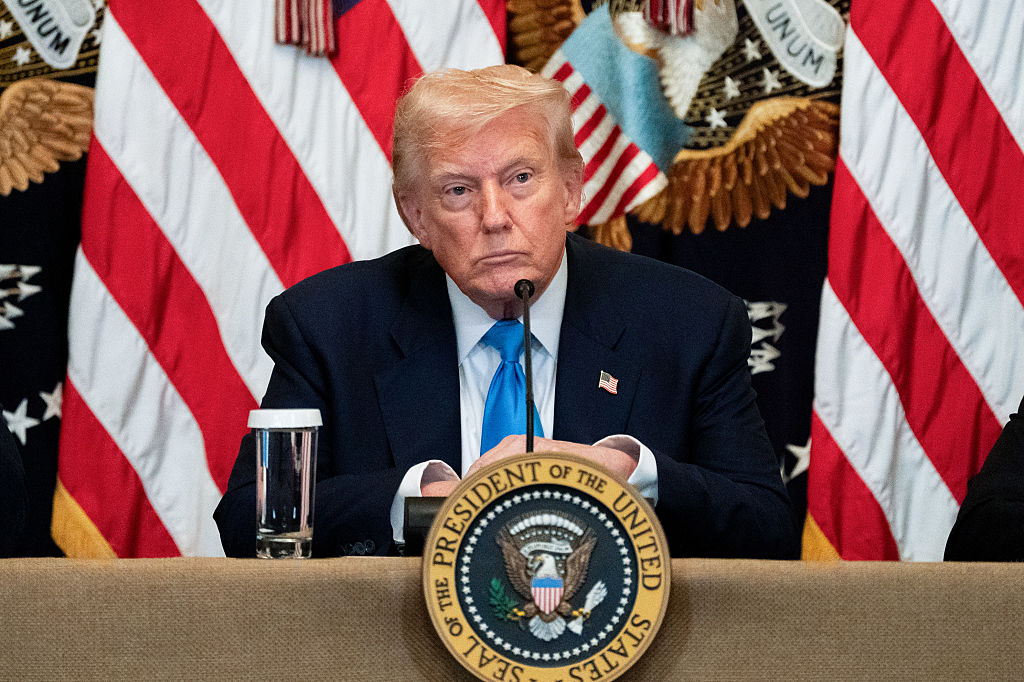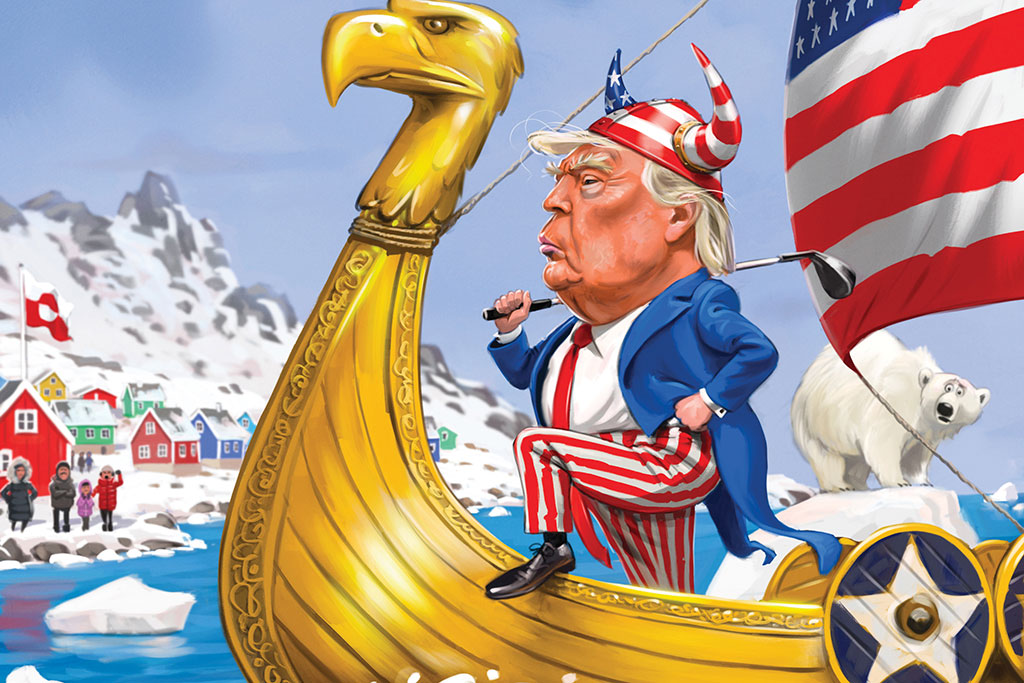Trump’s tariffs are here to stay
Trump's tariffs mean American businesses and consumers will have to pick up the tab

Get the latest financial news, insights and expert analysis from our award-winning MoneyWeek team, to help you understand what really matters when it comes to your finances.
You are now subscribed
Your newsletter sign-up was successful
Want to add more newsletters?

Twice daily
MoneyWeek
Get the latest financial news, insights and expert analysis from our award-winning MoneyWeek team, to help you understand what really matters when it comes to your finances.

Four times a week
Look After My Bills
Sign up to our free money-saving newsletter, filled with the latest news and expert advice to help you find the best tips and deals for managing your bills. Start saving today!
We were probably wrong about tariffs. Yes, of course, they were always a bad idea and still are. Anything that interferes with our ability to freely trade with each other will make us poorer, with less choice and lower quality goods and services. After the Trump administration’s “reciprocal” tariff bomb blew up in its face, in April, we thought tariffs would quietly go away, like a man who just made a fool of himself at a party. That’s about what happened with Canada during Donald’s first term. His team squawked about “unfair” trade with Canada and tore up the North American Free Trade Agreement (Nafta). Then, after protracted negotiations, it ended up with something very close to Nafta, and trade went on much as before.
We thought the negotiations with other countries would go the same way. But no. Even before the 1 August hikes, tariffs are at a 70-year high. And going higher. The details change by the day, but it’s clear who will pay: American companies and consumers. Yale University researchers project that Trump’s tariff strategy will raise costs for US families by $2,400 this year.
Tariffs can be used in a variety of vain and foolish ways – to promote foreign-policy goals, to influence other countries’ internal politics, to raise drug cartels’ profits, to pay off big political donors, and generally to make a mess of the economy. They can also be used to enrich those who impose them. An investigation by ProPublica has revealed that federal officials across multiple agencies sold stocks before Trump’s tariff announcements caused major market declines.
MoneyWeek
Subscribe to MoneyWeek today and get your first six magazine issues absolutely FREE

Sign up to Money Morning
Don't miss the latest investment and personal finances news, market analysis, plus money-saving tips with our free twice-daily newsletter
Don't miss the latest investment and personal finances news, market analysis, plus money-saving tips with our free twice-daily newsletter
Long-term impact of Trump's tariffs
Tariffs are a tax and taxes are supposed to be “fair”, which is to say, you’re not supposed to tax a Republican more than a Democrat or a plumber more than a carpenter. True, tax loopholes and credits have been used for decades to reward friends, punish enemies and drive the money where the feds want it to go. Want people to buy electric cars? Give them a tax subsidy. Want them to stop smoking? Impose a tax on cigarettes. But at least Congress – the people's parliament – has a say in who is taxed and how. Not so with tariffs. The president can tariff individual countries and give different rates to different nations. He can also target individual industries, regions and, like the bills of attainder that the US constitution tried to avoid, he can single out specific products and individual companies.
Washington has, for example, just imposed a 17% tariff on US imports of tomatoes, almost all of which come from Mexico. As Bloomberg notes, the move comes just days after Trump unveiled plans to impose a 30% tariff, beginning 1 August, on many Mexican products that don’t fall under the USMCA trade agreement he negotiated in his first term.
Neither Democrats nor Republicans will want to give up this kind of arbitrary power. So, tariffs may become a more-or-less permanent part of the US’s end-of-empire finances – a sneaky consumption tax, which gives the feds more money to spend, more opportunities for corruption, and another cudgel with which to beat anyone who stands in their way. Whatever fiscal benefit the feds get from higher tariff taxes – $300 billion is expected this year – is likely to be offset by lower GDP growth and lower tax receipts elsewhere. And over time, shackled with tariffs, the US economy will become less and less competitive.
For more from Bill, see bonnerprivateresearch.com
This article was first published in MoneyWeek's magazine. Enjoy exclusive early access to news, opinion and analysis from our team of financial experts with a MoneyWeek subscription.
Get the latest financial news, insights and expert analysis from our award-winning MoneyWeek team, to help you understand what really matters when it comes to your finances.
Bill Bonner is an American author of books and articles on economic and financial subjects. He is the founder of Agora Financial, as well as a co-founder of Bonner & Partners publishing.
-
 Should you buy an active ETF?
Should you buy an active ETF?ETFs are often mischaracterised as passive products, but they can be a convenient way to add active management to your portfolio
-
 Power up your pension before 5 April – easy ways to save before the tax year end
Power up your pension before 5 April – easy ways to save before the tax year endWith the end of the tax year looming, pension savers currently have a window to review and maximise what’s going into their retirement funds – we look at how
-
 How a dovish Federal Reserve could affect you
How a dovish Federal Reserve could affect youTrump’s pick for the US Federal Reserve is not so much of a yes-man as his rival, but interest rates will still come down quickly, says Cris Sholto Heaton
-
 New Federal Reserve chair Kevin Warsh has his work cut out
New Federal Reserve chair Kevin Warsh has his work cut outOpinion Kevin Warsh must make it clear that he, not Trump, is in charge at the Fed. If he doesn't, the US dollar and Treasury bills sell-off will start all over again
-
 How Canada's Mark Carney is taking on Donald Trump
How Canada's Mark Carney is taking on Donald TrumpCanada has been in Donald Trump’s crosshairs ever since he took power and, under PM Mark Carney, is seeking strategies to cope and thrive. How’s he doing?
-
 Rachel Reeves is rediscovering the Laffer curve
Rachel Reeves is rediscovering the Laffer curveOpinion If you keep raising taxes, at some point, you start to bring in less revenue. Rachel Reeves has shown the way, says Matthew Lynn
-
 Why does Trump want Greenland?
Why does Trump want Greenland?The US wants to annex Greenland as it increasingly sees the world in terms of 19th-century Great Power politics and wants to secure crucial national interests
-
 Investing in forestry: a tax-efficient way to grow your wealth
Investing in forestry: a tax-efficient way to grow your wealthRecord sums are pouring into forestry funds. It makes sense to join the rush, says David Prosser
-
 'Investors should brace for Trump’s great inflation'
'Investors should brace for Trump’s great inflation'Opinion Donald Trump's actions against Federal Reserve chair Jerome Powell will likely stoke rising prices. Investors should prepare for the worst, says Matthew Lynn
-
 'Expect more policy U-turns from Keir Starmer'
'Expect more policy U-turns from Keir Starmer'Opinion Keir Starmer’s government quickly changes its mind as soon as it runs into any opposition. It isn't hard to work out where the next U-turns will come from